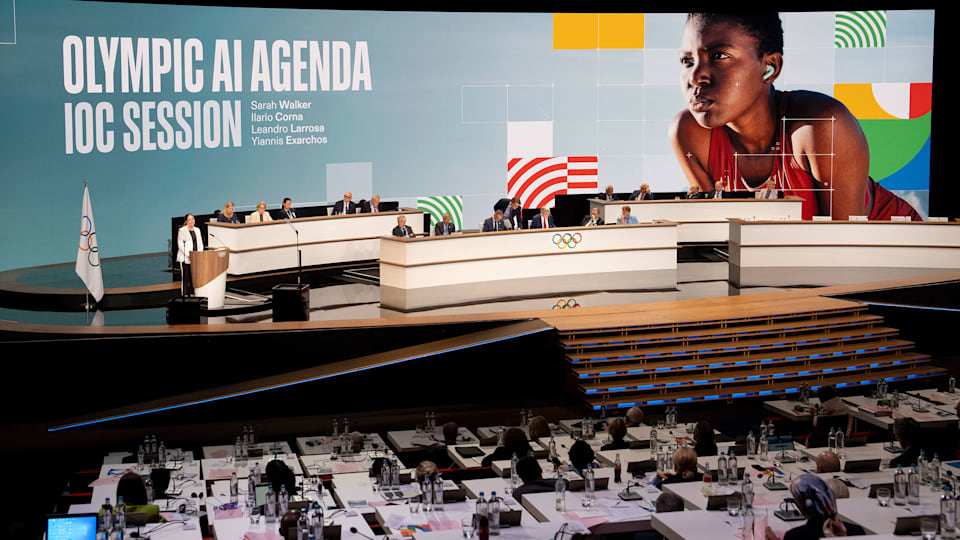IOC and Olympic Movement using the transformative power of AI to redefine the sports landscape
IOC Members meeting at the 142nd IOC Session in Paris today received an update on the implementation of the Olympic AI Agenda, the IOC’s ground-breaking initiative launched in April this year.

Introducing the topic to the Session, IOC Member Sarah Walker, Olympic silver medallist in BMX, Vice-Chair of the IOC Athletes' Commission and Chair of the IOC’s AI Working Group, explained: “Today, we are not just envisioning the future; we're actively creating it. We are using the transformative power of artificial intelligence to redefine the landscape of sports and bring the Olympic Movement into a new era. As an Olympian, I am excited by the transformative power of AI.”
The development of the Olympic AI Agenda has been supported by Worldwide Olympic Partners and Media Rights-Holders. In a series of interactive presentations and film clips, the assembled audience was able to witness first-hand how the IOC and its partners are already harnessing the power of AI to enhance the Olympic experience, with numerous initiatives either already a reality or in the pipeline.
We have identified over 180 potential use cases for AI across the Olympic Movement. Our task now is to prioritise these opportunities to maximise their impact.
Some of these uses will be on display in the next two weeks during the Olympic Games Paris 2024.
Among them, AI will be deployed during the Games to protect and safeguard athletes from cyber abuse. In another use case scenario, AI will assist athletes with analysing sporting performance through tools that provide instant insights into athlete performance, enabling them to make smarter decisions. New AI tools will also be deployed to enhance the fairness and accuracy of judging and refereeing through the provision of precise metrics.
New AI broadcast tools will offer opportunities for an enhanced viewer experience. Multicam replay, which uses AI to provide the viewer with a 360-degree view of an athlete’s performance, is being increasingly deployed, while the introduction of ground-breaking visuals such as athlete tracking, intelligent stroboscopic analysis and enhanced data graphics offer an enriched digital experience. Similarly, a software-based, AI-assisted platform for automated highlights generation is being introduced, which uses AI to identify and customise key video moments from thousands of hours of competition.
Beyond the athlete experience, and with energy consumption and sustainability front and centre of global concerns, AI can be used to streamline operations within the Olympic Movement, enhancing efficiency and sustainability. AI-designed virtual models that simulate Games operations can be used to optimise processes, support sustainability efforts, and reduce costs through precise simulations. Meanwhile, tools that can enhance the collection and analysis of energy consumption data will help future Games organisers to make data-driven decisions, ensuring right-sized and efficient energy solutions.
AI-based tools have already shown their worth in talent identification, which could enable the discovery of new athletes anywhere in the world, using just a mobile phone. Similar systems could be used to train coaches and entourage members.
For instance, the IOC, together with official AI platform partner Intel, is exploring how AI could revolutionise the way sporting talent is identified, with the creation a new custom-built technology. The technology has the potential to enable the discovery of new athletes from anywhere in the world, demonstrating the potential AI technology has to innovate how National Olympic Committees (NOCs) identify and invest in sports talent and creating more opportunities in the process.
The technology was tested for the first time in Senegal, which will host the first ever Olympic event in Africa – the Youth Olympic Games Dakar 2026. The IOC, together with Intel, and in partnership with the Senegalese Olympic Committee, deployed a team of sports scientists for a trial programme. Over 1000 young people from all corners of the country participated, providing unique information to the Senegalese NOC to identify and nurture future Olympians. 48 high performers were identified, who will now be included in a programme run by the Senegalese NOC. The programme in Senegal was captured in a short film, going behind the scenes of the trial and featuring some of Senegal’s rising young athletes.
AI is also being used to improve operational efficiency across the Olympic Movement through training programmes, webinars, on-site training and online courses.
When the IOC launched the Olympic AI Agenda, it did so fully aware that, while the technology offers exciting opportunities for the future, safeguards need to be put in place to ensure the integrity of its deployment. The IOC will engage with key stakeholders of the Olympic Movement, including NOCs, IFs and TOP Partners, through existing forums, but also through a new AI Forum to extend collaboration and knowledge-sharing beyond the IOC. This will provide valuable insights into effective AI strategies and promote best practices in this rapidly evolving field. Together with all stakeholders, the IOC plans to drive innovation and shape the future of sport with AI.